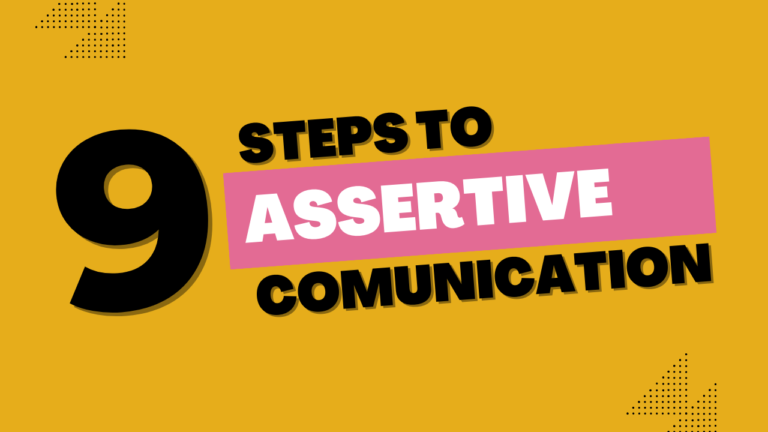In this episode of the Mental Health Toolbox, I discuss the 9-step formula for assertive communication.
Discover the power of assertive communication in this insightful and practical tutorial, designed to help you enhance your interpersonal skills and build stronger relationships. Learn how to confidently express your thoughts, feelings, and needs while maintaining respect for others, as we delve into the key principles of assertiveness, effective techniques, and real-life examples. By mastering the art of assertive communication, you’ll unlock the potential to reduce conflict, boost self-esteem, and create a more fulfilling and harmonious life. Whether you’re a seasoned communicator or just starting your journey towards self-improvement, this video is the perfect guide to help you navigate personal and professional interactions with ease and confidence. Don’t miss out on this valuable resource – hit the subscribe button, like, and share to empower yourself and others with the transformative skills of assertive communication!
Table of Contents
9 Step Formula For Assertive Communication:
- Identify Your Objective.
- Identify The Conflict.
- Choose A Time and Neutral Place To Have The Conversation.
- Validate Their Position (Show Respect For The Other Person’s Perspective).
- Express Your Position (Role, Feelings).
- Share Your Rational (Logic Behind The Ask).
- Be Specific About The Behavior Change Your Are Asking For.
- Be Prepared For Compromise (Know Your Negotiables and Non-Negotiables Ahead of Time).
- Keep An Open Dialogue (If You Offend or Confuse, You Lose).
*Some of the links found here are affiliate links: As an Associate I earn from qualifying purchases by way of commission at no additional cost to you. See full disclaimer here:
Watch The Video
If you liked this episode, be sure to check out my full playlist of interviews here: https://youtube.com/playlist?list=PLnPL9gahfhWatKmy2YSyU0jt20h_jrj3H
Listen To The Episode
The importance of assertive communication in personal and professional relationships
The importance of assertive communication in personal and professional relationships cannot be overstated, as it serves as the foundation for building strong connections, fostering mutual respect, and promoting a harmonious environment. By practicing assertive communication, individuals can confidently express their thoughts, feelings, and needs, while also actively listening and responding empathetically to the perspectives of others. This open and respectful exchange of ideas enhances understanding, reduces the likelihood of misunderstandings, and supports effective conflict resolution. Furthermore, assertive communication plays a vital role in establishing healthy boundaries, empowering individuals to safeguard their well-being and maintain a balanced life. Ultimately, adopting an assertive communication style not only improves interpersonal dynamics but also contributes to personal growth, increased self-esteem, and overall life satisfaction.
Understanding Assertive Communication
Definition of assertive communication:
Assertive communication is a style of communication in which individuals express their thoughts, feelings, and needs directly, clearly, and respectfully. It involves being honest and open about one’s own perspective while also actively listening and showing empathy towards others. Assertive communication strikes a balance between passive, aggressive, and passive-aggressive styles, allowing individuals to stand up for their rights and beliefs without dominating or disregarding the opinions of others. This approach promotes healthy, productive, and respectful interactions, fostering mutual understanding and effective conflict resolution in both personal and professional relationships.
Differences between passive, aggressive, passive-aggressive, and assertive communication styles:
Understanding the differences between passive, aggressive, passive-aggressive, and assertive communication styles is essential for fostering healthy and effective interpersonal interactions. Passive communicators tend to avoid expressing their thoughts, feelings, and needs, often prioritizing others’ opinions and desires over their own. This can lead to feelings of resentment and being undervalued. In contrast, aggressive communicators forcefully express their views and needs, frequently dominating conversations and disregarding the feelings and opinions of others. This behavior can damage relationships and create a hostile environment. Passive-aggressive communicators exhibit a combination of passive and aggressive traits, indirectly expressing their discontent or frustrations through subtle actions or sarcastic remarks, making it difficult for others to understand and address the underlying issues. Assertive communication, on the other hand, is a balanced approach that enables individuals to express their thoughts, feelings, and needs openly and respectfully while also actively listening and valuing others’ perspectives. This style facilitates mutual understanding, fosters healthy relationships, and promotes effective conflict resolution.
Benefits of assertive communication:
The benefits of assertive communication are numerous and far-reaching, impacting both personal and professional aspects of life. By adopting this communication style, individuals can experience increased self-esteem and self-confidence, as they learn to express their thoughts, feelings, and needs openly and honestly. Assertive communication also fosters mutual respect and understanding between people, leading to stronger, healthier relationships built on trust and open dialogue. It plays a crucial role in conflict resolution, as it enables individuals to address issues directly and constructively without resorting to passive, aggressive, or passive-aggressive behaviors. In professional settings, assertive communicators are more likely to be seen as competent, reliable, and effective leaders, as they demonstrate the ability to balance their own needs with those of their team members, making them better equipped to handle challenging situations and make informed decisions. Overall, embracing assertive communication contributes to improved mental and emotional well-being, enhanced interpersonal dynamics, and greater personal and professional success.
Key Principles of Assertive Communication
- Respect for self and others
- Clear and honest expression
- Active listening and empathy
- Nonverbal communication cues
Practical Techniques for Assertive Communication
Using “I” statements:
The importance of using “I” statements in assertive communication lies in their ability to facilitate open, honest, and non-confrontational dialogue between individuals. By starting sentences with “I,” the speaker takes ownership of their feelings, thoughts, and needs without placing blame or making accusatory statements towards others. This approach reduces defensiveness and encourages a more receptive response from the listener, paving the way for constructive conversations and effective conflict resolution. “I” statements promote self-awareness and personal responsibility, as they require individuals to reflect on their emotions and experiences before expressing them. Additionally, they foster empathy and understanding, as they provide insight into the speaker’s perspective, allowing others to better appreciate their feelings and concerns. Ultimately, using “I” statements in assertive communication contributes to healthier, more respectful, and productive interpersonal interactions.
Assertive body language:
Assertive body language plays a significant role in conveying confidence, openness, and respect during interpersonal interactions. It reinforces the verbal message being communicated and helps to establish a balanced and effective dialogue. Key elements of assertive body language include maintaining direct eye contact, which demonstrates active listening and genuine interest in the conversation; adopting an upright posture, which exudes self-assurance and poise; and using natural, relaxed gestures that complement and emphasize spoken words. Additionally, appropriate facial expressions that convey empathy and understanding, along with a calm and steady tone of voice, contribute to the overall assertiveness of one’s communication. By aligning verbal and nonverbal cues, assertive body language promotes clear, honest, and respectful exchanges, fostering mutual understanding and stronger connections between individuals in both personal and professional settings.
Setting boundaries:
The importance of setting boundaries in personal and professional relationships is crucial for maintaining a healthy balance and overall well-being. Establishing clear and consistent boundaries allows individuals to assert their needs, values, and limitations, promoting a sense of self-respect and autonomy. By defining and communicating these limits, individuals can effectively manage their time, energy, and emotional resources, preventing burnout and fostering healthier interactions with others. Setting boundaries also encourages mutual respect, as it signals to others that one’s needs and preferences are important and deserve consideration. Moreover, it contributes to the development of trust and open communication within relationships, as individuals feel more comfortable discussing their concerns and expectations. In the long run, setting boundaries empowers individuals to take control of their lives, enhances their self-esteem, and supports the cultivation of meaningful and fulfilling connections with others.
Handling criticism and feedback:
Handling criticism and feedback effectively is a vital skill in both personal and professional settings, as it enables individuals to grow, learn, and improve their performance. To manage criticism constructively, it is essential to approach feedback with an open mind and a willingness to listen, setting aside any defensive or emotional reactions that may arise. By actively engaging with the feedback, individuals can discern valuable insights and identify areas for growth or development. It is also important to differentiate between constructive criticism, which aims to foster improvement, and destructive criticism, which may be rooted in negativity or personal bias. Focusing on the former helps maintain a growth mindset and fosters resilience. Asking clarifying questions and seeking specific examples can further enhance understanding and facilitate productive discussions. Additionally, expressing gratitude for the feedback, regardless of whether it is positive or negative, demonstrates maturity and professionalism. Ultimately, embracing criticism and feedback as opportunities for growth contributes to personal and professional success, as well as stronger interpersonal relationships built on trust and open communication.
Tips for Developing Assertiveness
Self-reflection and self-awareness:
Developing self-reflection and self-awareness is essential for personal growth, emotional intelligence, and effective communication. To enhance these skills, individuals can adopt various practices that foster introspection and self-discovery. Journaling is a powerful tool for gaining insights into one’s thoughts, feelings, and experiences; writing regularly can help identify patterns, strengths, and areas for improvement. Mindfulness practices, such as meditation or deep breathing exercises, can also promote self-awareness by encouraging individuals to focus on their internal states and remain present in the moment. Seeking feedback from trusted friends, family members, or colleagues can provide valuable perspectives on one’s behavior and interpersonal dynamics. Engaging in open and honest conversations about personal experiences and emotions can also foster deeper self-understanding and empathy towards others. Additionally, setting aside dedicated time for self-reflection, whether through quiet contemplation or engaging in activities that inspire introspection, can facilitate personal growth and self-awareness. By committing to ongoing self-reflection and self-awareness practices, individuals can cultivate greater emotional intelligence, enhance their communication skills, and foster healthier relationships with themselves and others.
Building self-esteem and confidence:
Building self-esteem and confidence around assertive communication is a transformative process that empowers individuals to express their thoughts, feelings, and needs effectively while fostering healthier relationships. To develop these skills, it is essential to practice self-compassion and self-acceptance, recognizing one’s inherent worth and embracing personal strengths and imperfections. Engaging in positive self-talk and challenging negative beliefs can help reshape one’s mindset and reinforce self-confidence. Additionally, setting achievable goals related to assertive communication, such as expressing an opinion in a group setting or addressing a conflict directly, can provide opportunities for growth and build self-efficacy. Regularly practicing assertive communication techniques, including using “I” statements, maintaining appropriate body language, and setting boundaries, will gradually enhance one’s proficiency and comfort with this communication style. Seeking feedback from trusted individuals and reflecting on personal progress can further bolster self-esteem and confidence. By actively pursuing self-improvement and embracing assertive communication, individuals can cultivate a strong sense of self-worth, empowering them to navigate interpersonal interactions with greater ease and authenticity.
Practicing assertive communication in safe environments:
Practicing assertive communication in safe environments is an essential step towards mastering this valuable skill and integrating it into daily life. Safe environments, such as among trusted friends, family members, or supportive groups, offer a non-judgmental space where individuals can experiment with new communication techniques without fear of rejection or negative consequences. These settings enable individuals to explore their thoughts, feelings, and needs openly, encouraging honest self-expression and fostering personal growth. By practicing assertive communication in safe environments, individuals can gradually build their confidence and competence, refining their skills through trial and error. This process may include rehearsing specific scenarios, role-playing with a trusted partner, or engaging in group activities that promote assertiveness. As individuals gain experience and familiarity with assertive communication, they can transfer these skills to more challenging contexts, ultimately enhancing their ability to navigate diverse interpersonal situations effectively and respectfully. Practicing in safe environments thus serves as a crucial foundation for developing assertive communication skills and fostering healthier, more authentic relationships.
Seeking feedback from trusted sources:
The importance of seeking feedback from trusted sources cannot be overstated, as it plays a critical role in personal and professional growth, self-awareness, and effective communication. Trusted sources, such as close friends, family members, mentors, or colleagues, can provide objective and honest insights into one’s behavior, strengths, and areas for improvement. By engaging in open and candid discussions with these individuals, one can gain valuable perspectives that may otherwise be overlooked or dismissed due to personal biases or blind spots. Seeking feedback from trusted sources also fosters a sense of accountability.
Overcoming Challenges and Barriers to Assertive Communication
Dealing with cultural factors:
The challenges of assertive communication when dealing with cultural factors can be complex, as different cultures have unique norms and expectations surrounding interpersonal interactions. In some cultures, direct communication and expressing personal opinions may be valued, while in others, it might be perceived as disrespectful or inappropriate. Navigating these cultural nuances requires heightened sensitivity, adaptability, and understanding to ensure effective communication without inadvertently causing offense or misunderstanding. To address this challenge, individuals must invest time in learning about the cultural context in which they are communicating, including the values, beliefs, and social norms that shape the behaviors and expectations of their counterparts. This awareness can help individuals tailor their assertive communication style to align with the cultural context, striking a balance between expressing their needs and respecting cultural differences. Active listening, empathy, and open-mindedness are essential components of this process, as they facilitate greater understanding and collaboration across diverse cultural backgrounds. By acknowledging and addressing the challenges posed by cultural factors, individuals can enhance their assertive communication skills and foster more harmonious and productive relationships in multicultural settings.
Managing anxiety and fear:
Managing anxiety and fear around assertive communication is crucial for overcoming barriers to self-expression and fostering healthier, more authentic relationships. To address these emotions, individuals can employ various strategies that build confidence and reduce apprehension. One effective approach is to practice mindfulness techniques, such as deep breathing exercises or meditation, which can help calm the mind and body, enabling individuals to focus on the present moment and communicate more effectively. Additionally, preparing for assertive communication by rehearsing specific scenarios or scripting potential responses can alleviate anxiety by increasing familiarity and confidence in one’s abilities. Seeking support from trusted friends, family members, or professionals, such as therapists or coaches, can also provide valuable guidance and encouragement to navigate challenging situations. Gradually exposing oneself to situations that require assertiveness, starting with less intimidating contexts, can help build resilience and self-assurance over time. It is essential to remember that feelings of anxiety and fear are natural and can be managed through consistent practice, self-compassion, and persistence. By proactively addressing these emotions and engaging in regular assertive communication practice, individuals can overcome their fears and develop more effective communication skills for personal and professional success.
Acknowledging and addressing past experiences that hinder assertiveness:
Acknowledging and addressing past experiences that hinder assertiveness is a vital step towards personal growth and effective communication. Our previous encounters can shape our beliefs, behaviors, and attitudes, sometimes leading to the development of unhelpful patterns or limiting self-concepts. It is essential to examine these past experiences, identify any underlying fears or negative beliefs that may be inhibiting assertive communication, and work towards overcoming them. This process may involve reflecting on moments when one felt silenced, dismissed, or unable to express their needs, and understanding how these situations have influenced present-day communication styles. Engaging in therapeutic practices, such as journaling, counseling, or support groups, can provide valuable insight and guidance in addressing the impact of these experiences. By recognizing and confronting past challenges, individuals can begin to reframe their beliefs about themselves and their ability to communicate assertively. This newfound understanding can empower them to break free from restrictive patterns, develop healthier communication strategies, and build more authentic relationships. Addressing past experiences that hinder assertiveness is a transformative journey that fosters self-awareness, resilience, and personal growth.
Conclusion
In conclusion, the importance and benefits of assertive communication cannot be overstated, as it plays a pivotal role in fostering healthier, more authentic relationships, both personally and professionally. By expressing thoughts, feelings, and needs openly and respectfully, assertive communication enables individuals to establish clear boundaries, resolve conflicts effectively, and maintain a balanced sense of self-worth. This communication style empowers individuals to advocate for their well-being and cultivate a strong sense of self-confidence, leading to improved mental and emotional health. Additionally, assertive communication enhances interpersonal understanding, promotes mutual respect, and facilitates productive collaboration, strengthening connections and fostering a supportive environment. By investing time and effort into developing assertive communication skills, individuals can reap numerous benefits that extend beyond interpersonal interactions, including enhanced decision-making abilities, increased self-awareness, and personal growth. Ultimately, assertive communication is a vital life skill that contributes significantly to overall well-being and success in various aspects of life.
As you continue on your journey towards mastering assertive communication, remember that growth and progress require consistent practice and dedication. Embrace each opportunity to refine your skills and learn from your experiences, both successes and challenges. It is important to be patient with yourself, as developing new habits and overcoming ingrained patterns takes time and effort. Surround yourself with supportive individuals who encourage your growth, and seek out resources such as books, workshops, or coaching to further enhance your understanding and abilities. As you progress, celebrate your achievements and acknowledge the positive impact that assertive communication has on your relationships and well-being. By maintaining a growth mindset and staying committed to your personal development, you will undoubtedly reap the rewards of effective assertive communication, empowering you to navigate life’s challenges with confidence, resilience, and authenticity. Keep pushing forward, and remember that every step you take brings you closer to becoming the best version of yourself.
Additional Resources
Here is a list of some of the best-selling books on assertive communication, which can provide valuable insights and guidance for developing effective communication skills:
- “Assertiveness: How to Stand Up for Yourself and Still Win the Respect of Others” by Judy Murphy
- “The Assertiveness Workbook: How to Express Your Ideas and Stand Up for Yourself at Work and in Relationships” by Randy J. Paterson
- “When I Say No, I Feel Guilty” by Manuel J. Smith
- “Your Perfect Right: Assertiveness and Equality in Your Life and Relationships” by Robert E. Alberti and Michael L. Emmons
- “Assertiveness for Earth Angels: How to Be Loving Instead of ‘Too Nice'” by Doreen Virtue
- “The Power of Communication: Skills to Build Trust, Inspire Loyalty, and Lead Effectively” by Helio Fred Garcia
- “Speak Up, Show Up, and Stand Out: The 9 Communication Rules You Need to Succeed” by Loretta Malandro
These books cover various aspects of assertive communication, such as techniques, strategies, and practical applications, to help you develop the necessary skills for more effective communication in different areas of your life.
*Some of the links are affiliate links: As an Associate I earn from qualifying purchases by way of commission at no additional cost to you.
Want to learn more? Check out my top picks for books on self-improvement and recovery HERE!
The Mental Health Toolbox: Resources and Support for Therapists Seeking Growth & Impact.
Mission Statement: To equip therapists with the tools, knowledge, and strategies they need to enhance their practice, boost their income, and ultimately, improve the lives of their clients. We achieve this through accessible, high-quality content, practical resources, and a supportive community.
NEED CRISIS HELP? If you need immediate crisis help with your depression, you can call the National Suicide Prevention Lifeline at 1-800-273-8255 or text “START” to 741-741
OUTSIDE THE UNITED STATES: See International Suicide Hotlines
WHERE TO FIND MENTAL HEALTH HELP:
-NAMI Referral Helpline: 1-800-950-6264
-California’s Statewide Mental Health Helpline: 1-855-845-7415
ASK: If you have a question you’d like me to answer here on the blog (even if you think it’s a silly one!), please use the form on the CONTACT ME page, or the comment section below. I would be happy to take a poke at it and provide a long form answer when appropriate.
SHARE: Also, be sure to share it with a friend, as there is still a lot of work to be done in raising mental health awareness.
SUBSCRIBE to get your FREE MOOD TRACKING TOOL and quick Mental Health Hacks in addition to this newsletter. Sign-up with the form below.
[mc4wp_form id=”142″]
admin
Latest posts by admin (see all)
- How to Build a Referral Engine Without the “Hustle”: - January 12, 2026
- ADHD Tips for Therapists | with Dr. Jennifer Dall - May 28, 2025
- Why Therapy Fails Men (And How to Fix It) – Insights with Marc Azoulay - May 11, 2025











